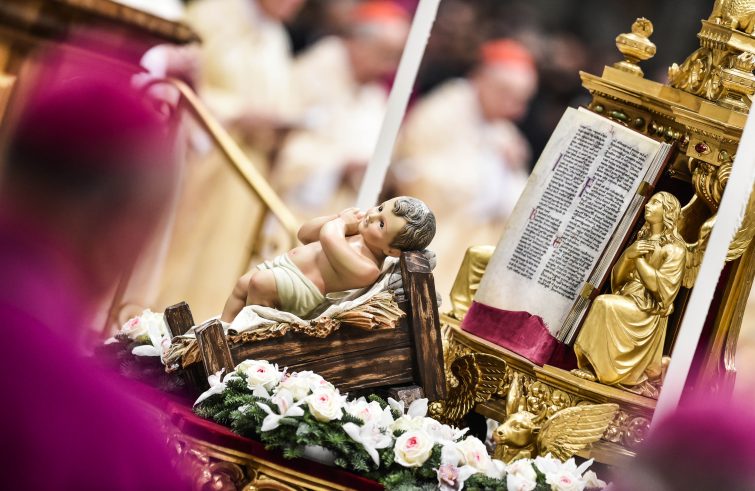
Celebrating Christmas Midnight Mass earlier is not a novelty, as evidenced in the new Missal that removed the section of the previous 1983 Missal, which read: “According to the established tradition of the Churches in Italy, Christmas Eve Mass is celebrated at midnight unless pastoral considerations, evaluated by the local Ordinary, recommend to celebrate it in advance.” However, according to Don Paolo Tomatis, Professor at the Theological Faculty of Northern Italy, “what may be seen as prophetic concern in this time of COVID-19, indeed already took into account the fact that Midnight Mass cannot be celebrated in all Italian parishes, as a number of parish priests serving several congregations can no longer deliver Christmas Mass in the middle of the night.”
What kind of Christmas should we expect from a liturgical point of view?
Albeit somewhat unadorned, it will be a true Christmas. And also the liturgy will be marked by the limitations of our present time, namely, not being able to live out the tradition in full, which involves both personal and community life: to sing our solemn hymns, to walk in procession, to embrace as a sign of peace, to enter the darkness of the night, to kiss the Child in the nativity scene… And yet it will be a real Christmas, undoubtedly a more simple one, where however
nothing that constitutes the core of the festivity will be missing: the prayerful congregation, the singing of the angels (this year in the new version of the Missal: “and peace on earth to men, loved by the Lord”), the richness of the Word, the Word made flesh, in accordance with the Sacrament.
Why do we have four celebrations for Christmas?
The ancient tradition of the Church of Rome originated the four Christmas Masses, each with its own formulary: the first was the Mass during the Day, celebrated already in the 4th century in Saint Peter’s. To this was added a Night Mass celebrated in the 6th century in the Basilica of St. Mary Major, the first Marian basilica in the western world, built shortly after the Council of Ephesus affirmed Mary’s title as Mother of God, Theotokos. The Crypt of the Nativity was added in the 6th century, echoing the Nativity scene in Bethlehem. As a result of the inspiration of the liturgy of that Basilica, which the pilgrims of the Holy Land wanted to reproduce, a night Eucharist started being celebrated, which is the source of today’s Midnight Mass.
The Mass at Dawn, however, has a remarkable origin: in Rome’s Basilica of St. Anastasia, the Greek community commemorated the day of the saint’s martyrdom. The Pope would stop on the way from St. Mary Major to St. Peter’s and celebrate a Holy Mass dedicated to the martyr, also mentioned in the Roman Canon.
Subsequently, the formulary of this Mass was replaced with a formulary (prayers and readings) of the Nativity. This led to the three Masses celebrated by the Church on Christmas Day, to which was added the Christmas Eve Mass. These are all Christmas Masses, but differing in their emphasis: on Christmas Eve, we find the theme of the coming of the Lord (“Today you will know that the Lord is coming to save us, and tomorrow you will see his glory”); at Night, Isaiah’s prophecy resounds: “The people walking in darkness have seen a great light”; at Mass at Dawn, the themes are similar to those of the night; at Mass during the Day, with John’s Prologue we are invited to contemplate the Word made flesh.
Is it possible to celebrate a Mass at 8 p.m. to comply with the curfew?
The Missal does not explicitly mention Midnight Mass, but Mass “at night “, in memory and imitation of Luke’s account of the Late Night Visit of the Shepherds.
The western tradition led to celebrate this Mass in the middle of the night, when darkness sets in and it’s time to go to sleep.
A biblical reference to Midnight can be found in a verse from the Book of Wisdom, applied to Christmas in the Christian tradition: “While gentle silence enveloped all things, and night in its swift course was now half gone, thy all-powerful word leaped from heaven, from the royal throne…” (Wisdom 18:14).
Does anticipating the time of Mass infringe only tradition or also liturgical practice?
Mass at night has a symbolic value, and so does Midnight, symbolizing the intensity of nighttime. However, imagining midnight as the hour of Christ’s birth is such a naïve thought that it makes me smile. Indeed, simple people’s bewilderment, as they shake their heads over the fact that this year Jesus must be ‘born earlier’ (how far have we gone?) must be viewed through the lenses of popular religion, less interested in the historical truth of the events of salvation (was Jesus born in December? Was he born in Bethlehem?) while fully immersed in the truth of the story offered by tradition. And yet
what matters is to proclaim at night time, i. e. in darkness, ‘the radiance of Christ, the true light of the world’”.
One may rightfully ask, in this respect, around what time can Night Mass be celebrated: if there is no Christmas Eve Mass, can Night Mass be celebrated as early as 7 p.m.? At such a singular time, the answer is yes.











